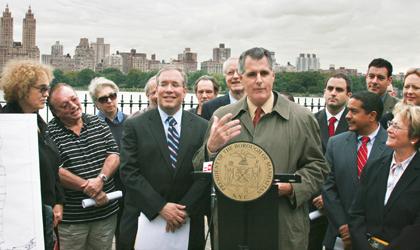By Anna Gustafson
The City Council unanimously passed Councilman James Gennaro’s (D-Fresh Meadows) resolution Monday that calls on Albany to ban drilling in the city’s watershed — a move he has said would result in the city spending billions of dollars on a filtration system and could potentially contaminate the drinking water supply for residents in the city and Westchester.
“It is not an overstatement to say that this is the most important issue facing the city of New York right now,” Gennaro said. “Our water supply is our most precious capital asset and it is absolutely irreplaceable.”
The state Legislature passed a law in July 2008 that allows wells tapping into gas deposits across upstate New York to be located more closely to one another than previously permitted, making it economically feasible for wide-scale drilling to begin near the city’s drinking water reservoirs.
Should drilling be allowed in the 1 million-acre watershed that provides drinking water for more than 8 million city residents and 1 million people in Westchester and other counties, Gennaro has said the city would be forced to construct a water filtration plant that probably would cost $10 billion to construct and about a billion dollars annually to operate.
While unlikely, Gennaro said water contamination was a possibility.
“If contamination did make it into our water supply, we would not be able to adequately filter it out,” he said.
At the end of September, the state Department of Environmental Conservation released its draft environmental impact statement on the natural gas drilling activities in the Marcellus Shale formation, which runs for about 600 miles through New York, Pennsylvania, Ohio and Virginia.
The statement did not ban gas drilling, but it did set rules as to where wells may be drilled and requires gas companies to publicly disclose which chemicals they use while extracting the gas.
In addition to calling on Albany to ban drilling within the watershed, the Council resolution passed Monday asks the federal government to better regulate the practice of hydraulic fracturing, a process of extracting natural gas that entails injecting up to 5 million gallons of water laced with chemicals into the ground at high pressure to break the rock.
The method has been criticized by city government officials and environmentalists.
“History has shown us the consequences of putting the acquisition of fossil fuels ahead of environmental concerns,” Council Speaker Christine Quinn (D-Manhattan) said. “We simply cannot afford to jeopardize the health and financial well-being of New Yorkers by allowing the natural gas industry to undertake large-scale development in the Catskill and Delaware watershed.”
Last summer the U.S. Land Management Bureau documented that groundwater in Sublette County, Wyo., which has one of the country’s largest natural gas fields and where hydraulic fracturing is commonly employed, had been contaminated with benzene, a substance that has been linked to cancer and nervous system disorders.
Reach reporter Anna Gustafson by e-mail at agustafson@cnglocal.com or by phone at 718-229-0300, Ext. 174.



































